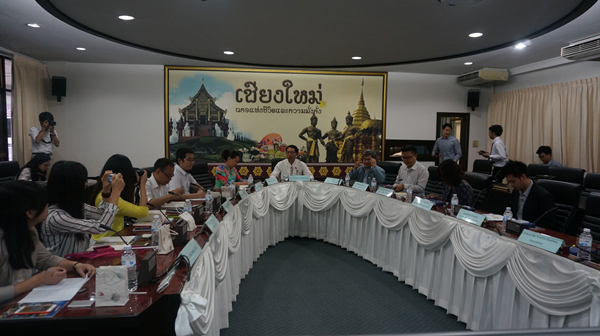On 6-8 August 2015, Ms. Lada Phumas, Director of Information and Public Relations Division (IPRD) of ASEAN-China Centre (ACC), led the Chinese media delegation to attend meetings, conducted interviews and site-visits in Chiang Mai and Lampang Provinces as the last two stops of the “Reporting Trip” in Laos and Thailand along Route 3A (R3A).
On 6 August 2015, Vice Governor Chana Pangwiboon of Chiang Mai Province, accompanied by relevant officials at the provincial level, met with the Chinese media delegation. Vice Governor of Chiang Mai and his team welcomed the delegation on behalf of the 1.67 million citizens of Chiang Mai Province as a major tourist destination for the Chinese in Thailand. He said that over the past five years Chiang Mai had made a great leap forward in strengthening ties with China attracting more Chinese investors and tourists.

In the Q&A session of the interview, the Chinese media delegation was interested in receiving information and exchanged views on a variety of issues such as Chiang Mai’s future plans to strengthen connectivity with China, the contribution of Route 3A to Chiang Mai’s economic growth and development, life style, and its connectivity with China, challenges brought about by the booming tourism especially from China and related solutions as well as the Province’s recommendations for the Chinese Government to better facilitate tourists from Thailand to China through R3A. The meeting was informative, whereby the media also learnt about taste and behaviour of the Chinese tourists in Chiang Mai and way forward to enhance sustainable tourism cooperation.


The journalists, on the same day, also interviewed Ms. Siriporn Tantipong, Chairman of the Federation of Thai Industries, Chiang Mai Chapter, and Mr. Varodom Pitakanonda, Vice Chairman of the Chiang Mai Chamber of Commerce, and prominent enterprisers in Chiang Mai doing businesses with China. The Thai business people expressed their hopes for the authorities concerned in China to simplify documentation process for Thai exporters and keep the quarantine criteria transparent and steady.
On 7 August 2015, the media delegation paid courtesy call to and conducted a joint interview with Mr. Chao Xiaoliang, Chinese Consul-General in Chiang Mai. Mr. Chao assured the journalists that Chiang Mai people are ever ready to welcome more Chinese people and Chiang Mai is a safe destination for the Chinese tourists. The Chinese Consulate General in Chiang Mai is joining efforts with the authorities concerned in Chiang Mai and related Provinces in the vicinity to ensure the Chinese tourists a safe, pleasant and enjoyable stay in Chiang Mai and the northern provinces of Thailand.


On the same day, the journalists visited Chiang Mai University (CMU) and conducted three joint interviews, themed on “CMU's Preparedness for ASEAN Community and Education Exchanges with China” with Associate Professor Rome Chiranukrom, Vice President for International Relations and Alumni Affairs, Mr. Rien Lovemongkol, Director of Confucius Institute and Associate Professor Pairat Trakarnsirinont, Dean of the Faculty of Political Science and Public Administration respectively.
Associate Professor Rome gave an overall picture of CMU and its efforts to promote educational exchanges within ASEAN as well as between Thailand and China, saying that CMU, currently enrolling 3,000 Chinese students, was taking the lead in admitting Chinese students among ASEAN universities. He expressed CMU’s support to China’s “One Belt One Road” initiative, saying that the cooperation under this initiative including the building of the Maritime Silk Road would bring prosperity and greater connectivity between ASEAN and China. The media delegation was impressed with the activities conducted by the Confucius Institute, which had helped promoted better understanding between the Thais and Chinese people.
On 8 August 2015, the media delegation met with Vice Governor Rittipong Tachapunt of Lampang Province while it was visiting the National Elephant Institute of Thailand. Vice Governor expressed his appreciation to the Chinese government for encouraging more Chinese tourists to Thailand. The 6.8 million Chinese tourists to Thailand in 2014 had well exceeded the 5 million target set by Chinese leaders. He expressed his sincere wish that the Chinese journalists would give highlights to Lampang in their reports to attract more tourists to explore the great potential landscapes and culture in the Province.
The “Reporting Trip” in Chiang Mai and Lampang was productive. IPRD of ACC coordinated all the meetings, and Director Lada acted as the moderator. took all the opportunities to introduce ACC and its roles and mandates to promote ASEAN-China functional cooperation in the areas of trade, investment, education, culture and tourism as well as ACC’s endeavour to engage with ASEAN and Chinese media to raise awareness about ASEAN and ASEAN-China relations. ACC has consistently continued its great efforts to create mutual understanding and enhance friendship and cooperation between the peoples of China and ASEAN as well as China and Thailand.
In Chiang Mai Province, the journalists made site-visits to Wat Phrathat Doi Suthep and the Royal Park Rajapruek, while in Lampang Province, they visited the National Elephant Institute of Thailand.
Before the media delegation’s departure for Chiang Mai Airport to catch flights back to China, Director Lada accepted a live telephone interview by the Bangkok Station of China Radio International (CRI) via FM103 at 15.00 hrs. (Thailand time) and a face-to-face interview by Caijing Magazine of China to officially wrap up the “Reporting Trip”. She also thanked the Chinese media delegation for its enthusiasm, tireless and energetic efforts throughout the seven-day Trip. It was firmly believed that the “Reporting Trip” had fulfilled its mission to facilitate a better understanding and knowledge of the general public about the significance, progress and benefits of the ASEAN Community building in 2015 and ASEAN-China Strategic Partnership in its Diamond Decade. Connectivity remains an important ingredient in the relationship between ASEAN and China and R3A, a part of Kunming-Bangkok Highway, had proven to be one of efficient ways to connect China, particularly the southern part of China like Yunnan, to ASEAN countries like Laos, Myanmar and Thailand.
